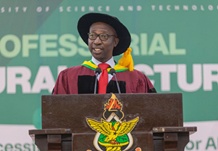Business News of Wednesday, 16 April 2025
Source: www.ghanawebbers.com
Nanotechnology key to green energy future – Prof. Owusu Boadi

Professor Nathaniel Owusu Boadi recently delivered a lecture. The topic was "Toward accessible green energy for all: harnessing the power of the invisible giants."
He discussed how nanomaterials have evolved over time. He highlighted their modern applications in energy technologies. According to him, nanotechnology can improve solar cells and battery efficiency. It can also advance fuel cell technologies, which are vital for greener energy.
In Ghana and many African countries, access to solar energy is limited. This is mainly due to the high cost of traditional silicon-based solar cells. Nanomaterials could lower costs and enhance efficiency, making solar energy more accessible.
Prof. Owusu Boadi urged the government to invest in nanomaterial research and development. He called on regulatory bodies like the Environmental Protection Agency to create safety guidelines for nanomaterials. These guidelines should align with international best practices.
He proposed establishing a National Nanotechnology Research Centre. This centre would be led by the Ministry of Environment, Science and Technology (MEST). It would work with the Ministry of Finance, academia, and industry stakeholders.
The centre aims to promote local innovations in nanotech-based energy solutions tailored for Ghana's needs. Prof. Owusu Boadi also noted that nanotechnology has broader applications beyond energy.
In healthcare, it aids early diagnosis through advanced imaging techniques. In environmental science, it helps with water purification and hazardous waste cleanup. The electronics and textile industries benefit from faster semiconductors and smart fabrics.
Despite progress in electrification—85.1% access rate as of 2022—many rural areas still lack reliable power in Ghana. Across sub-Saharan Africa, about 600 million people live without electricity.
This gap presents both challenges and opportunities for Ghana. By investing in nanotechnology, Ghana could develop sustainable energy solutions locally. This would help close the electricity gap while positioning Ghana as a hub for green innovation.










